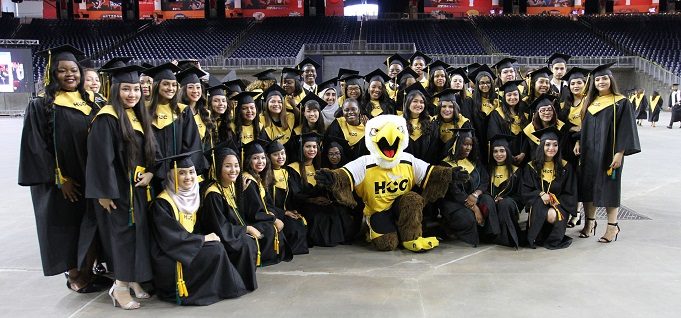Early pathways, future success
By Catherine O'Brien
December 5, 2017
Houston Community College’s seven Early College High Schools utilize individualized, personal attention to help students succeed.
This fall, a goal is being achieved and a new one begins. After several years of dedication and hard work, Ruth “Navil” Izaguire is attending graduate school at St. Thomas University in Houston to earn her MBA in healthcare administration.
Graduating in 2008 from the Challenge Early College High School at Houston Community College (HCC) played a significant part in opening doors to world-class institutions like University of St. Thomas and the University of Houston, where she earned a bachelor of science in human nutrition. Izaguire exemplifies the heights students can reach when provided with the right foundation for success.
Creating a college-going mindset in high school students is a priority for HCC because we have seen the power education and mentorship have in changing the trajectory of our students’ lives. The seven Early College High Schools at HCC play a crucial role in building pathways to student success by immersing students in an enriched education experience and giving them an opportunity to earn certifications and degrees that will serve them well later in life.
The program at HCC serves more than a thousand students from diverse backgrounds in the greater Houston region, including a high percentage of minority students and lower socio-economic students. We focus on unique practices based on the concept of individualized, personal attention and skills development.
The first best practice is our Texas Success Initiative (TSI) Academy Program. In this model:
- Students take HCC’s institutional placement test. If they do not meet college readiness standards, TSI coaches use the individualized assessment diagnostic to address specific skills the student needs.
- Instruction typically is comprised of independent work and small-group instruction.
- Academies may be held in the summer, during the school day or after school, depending on community need — building on the concept of individualized, personal attention.
- Credentialed English and math instructors interact with students on a “teacher-as-coach” philosophy.
- At the end of this intervention, students take the placement test again per the recommendation of the TSI coach. The majority of the students are successful and can begin their college journey.
The second high-impact practice is our summer bridge program. HCC’s program exposes students to academic and support services. Also, students participate in team-building activities that address communication, time management and other relevant skills focused on student success.
As a result, student outcomes have improved, including increases in graduation rates and passing rates on state exams, college-readiness and participation in college-level coursework. From a data perspective, we are on the right track.
In 2016, 339 students completed an associate degree while in high school (up from 260 in 2015) and graduated from HCC before participating in their high school graduation. Additional students completed a certificate in addition to their high school diploma.
Due to the hard work of both students and campus teams, our campuses achieved state and national recognition from organizations such as the Texas Education Agency, Children at Risk and U.S. News Best High School Rankings.
I recently ran into a community member whose son took advantage of the Early College High School program. After graduating with an associate degree, his student went on to a four-year institution, entering as a junior at the age of 18. I also met a former student at a community event who is thriving as a result of the program. He shared that he was not a good student, but once he was involved in the ECHS program, things started to change. He has since graduated from a four-year institution and credits his involvement with the ECHS program as a reason for his success.
When such stories are shared, it is clear to them that this program changes lives. This program creates a learning environment where students’ self-esteem rises and where they thrive academically. It is a program of hope for the future.
Have thoughts? Discuss on LinkedIn.


